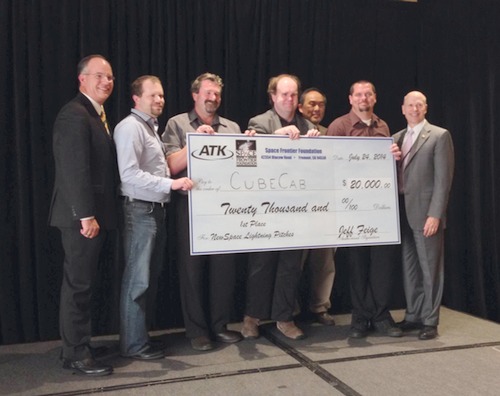
Members of the CubeCab team, including CEO Adrian Tymes (center), and prize sponsors pose with the $20,000 first-prize check at the Lightning Pitch awards ceremony Thursday evening. (credit: J. Foust)
For the second year in a row, a company that seeks to develop an air-launch system for small satellites has won a business plan competition organized by the Space Frontier Foundation.
CubeCab beat out six other companies in the competition held Thursday during the NewSpace 2014 conference in San Jose, California. The “Lightning Pitch” competition was a slimmed-down version of previous business plan competitions held by the organization, with companies required to give a four-minute pitch to judges, followed by a three-minute question-and-answer session.
CubeCab won the $20,000 first prize by pitching an air launch system that can place individual CubeSats into orbit. The system would be able to place individual CubeSats into orbit on dedicated launches at the same price as current rideshare arrangements, where CubeSats fly as secondary payloads on larger launch vehicles: $100,000 for a 1U cubeSat and $250,000 for a 3U CubeSat.
“The judges felt they were in line to solve one of the number one problems that we have in our industry,” said Thomas Olson, organizer of the competition, during a brief awards ceremony Thursday evening, alluding to the challenges CubeSat developers face in getting their spacecraft launched. “They had a management and technical team they thought was really unsurpassed among all the contestants today.”
CubeCab disclosed few specifics about their air-launch design. In his brief pitch, company CEO Adrian Tymes listed some technologies the system will incorporate, from room temperature self-pressurizing propellants to the use of 3-D printed components, but not a complete system architecture. “We’re still weighing the various options,” he said in a brief interview after winning the competition Thursday evening.
CubeCab believes it can develop this system quite inexpensively. Tymes said in his presentation that the company is seeking $500,000 in a seed round and $4–5 million in a Series A round. That would be sufficient, he said, to develop the system, although he said the company might need a couple million dollars more to give it “runway” before revenue from launch services kicked in. The presentation, though, didn’t given the company time to break down its costs.
Tymes, in the interview Thursday evening, said he planned to set aside half of the $20,000 prize to cover future expenses, and the rest to pay off some debts and provide bonuses to the team. “We have major credibility as this point,” he said exuberantly in the interview. “This is a victory for the democratization of space.”
CubeCab is the second air launch company in as many years to win first prize at a business competition run by the Foundation. Last year, when the organization ran a full-fledged business plan competition, Generation Orbit won first place.
In this year’s competition, RockZip, a maker of high-altitude balloons, won second place at $7,500. Elysium Space, a company that plans to launch cremains into space inside CubeSats, won the $2,500 third prize.

Leave a Reply